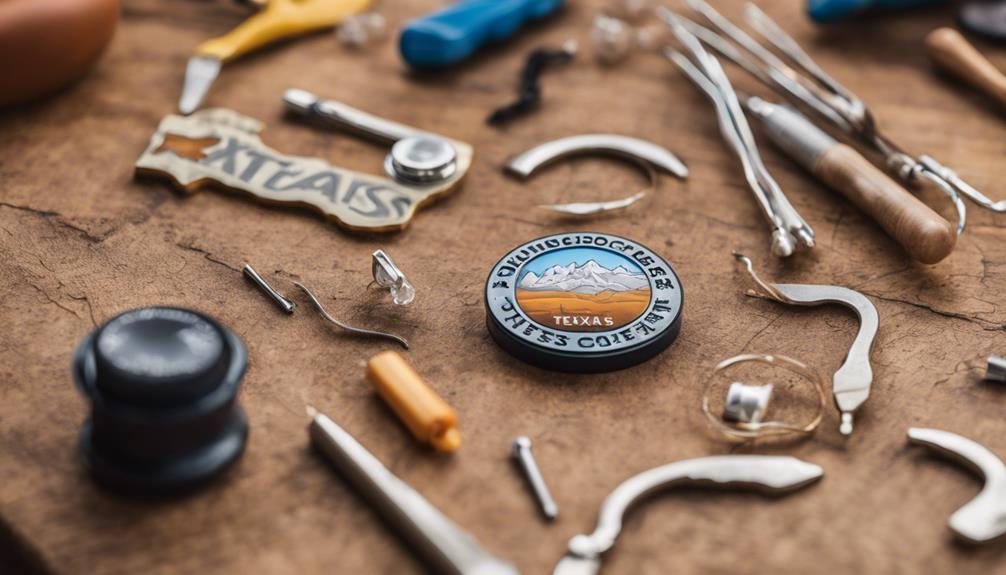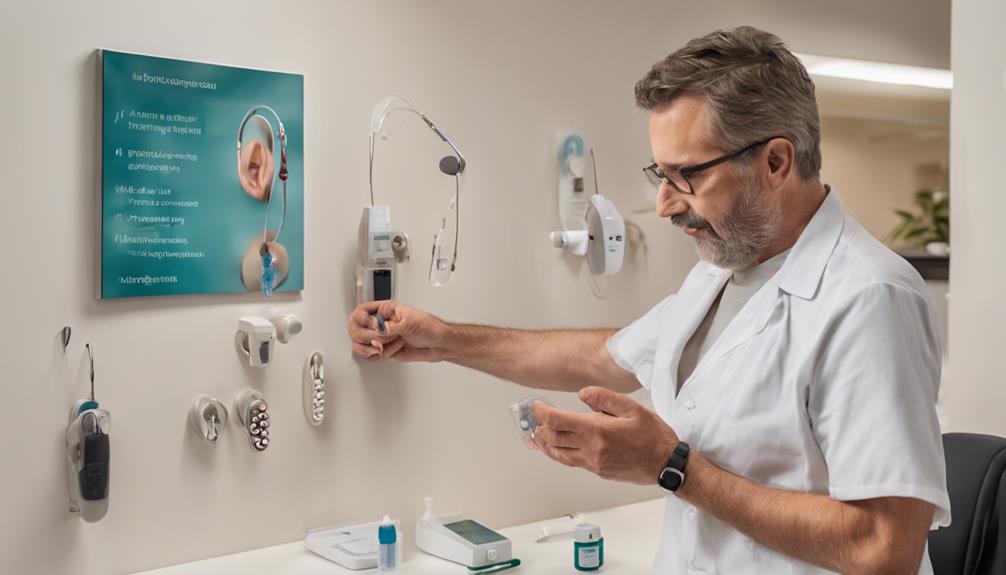If you're in the hearing aid industry in Texas, understanding the Fitting and Dispensing of Hearing Instruments Bond is essential for your practice. This bond not only protects consumers but also upholds the integrity of your profession. You're likely aware of the required bond amounts, but do you know the real implications of non-compliance and how it can affect your business? As we explore the responsibilities and benefits tied to this bond, you might find some surprising insights that could impact your approach to compliance and client relations.
Overview of the Bond

The Texas fitting and dispensing of hearing instruments bond serves as a crucial financial safeguard for consumers and professionals alike. This bond ensures that practitioners comply with state regulations while providing hearing aids and related services.
When you engage a hearing instrument specialist, you want the assurance that they're following industry standards and acting in your best interest.
The bond acts as a form of protection in case of malpractice or unethical behavior. If a consumer suffers financial loss due to the specialist's misconduct, they can file a claim against the bond to recover their losses. This means you have an added layer of security when investing in your hearing health.
Moreover, the bond also establishes a level of professionalism in the industry. By requiring specialists to secure this bond, Texas promotes accountability and transparency.
You can feel more confident knowing that your provider has a financial commitment to their practice.
Who Requires the Bond
If you're a hearing instrument specialist in Texas, you're required to obtain this bond to legally operate. This bond is crucial for anyone fitting or dispensing hearing instruments within the state, as it serves to protect consumers from unethical practices. It ensures that you adhere to the laws and regulations governing your profession.
In Texas, this requirement isn't limited to just established specialists; it also applies to new practitioners entering the field. If you're planning to start a business or take over an existing one in this industry, you'll need to secure the bond as part of your licensing process.
Additionally, if you work for a company that dispenses hearing aids, the business itself may also need to hold a bond, depending on its structure and practices.
Ultimately, the bond protects your clients by providing a financial guarantee that you'll comply with industry standards. In case of any violations, such as failing to deliver promised services or engaging in unethical practices, the bond can offer a means for consumers to seek compensation.
Bond Amount and Terms

In Texas, the bond amount required for fitting and dispensing hearing instruments typically ranges from $10,000 to $30,000, depending on specific factors like business size and scope.
It's essential to consider various Texas surety bonds that may apply to your industry. If you're starting a hearing instrument business, you'll need to assess your situation to determine the exact amount you'll be required to secure.
The bond serves as a financial guarantee to protect your clients. If you fail to comply with regulations or your clients suffer damages due to your negligence, they can make a claim against your bond. This means you're financially responsible for resolving any issues, up to the amount of the bond.
Terms for these bonds often last for one year, after which you'll need to renew it. Renewal might involve re-evaluating your business practices and ensuring you're still compliant with the state's regulations.
It's crucial to understand that the bond amount can influence your overall business costs, so be sure to factor this into your budget.
Choosing the right bond amount and understanding its terms can help you establish credibility and trust with your clients from the get-go.
Application Process
Navigating the application process for a Texas fitting and dispensing of hearing instruments bond can seem daunting, but it doesn't have to be.
Start by gathering the required documents, which typically include your business license, proof of liability insurance, and any relevant professional certifications. Make sure everything is up-to-date and accurate to avoid delays.
Next, you'll need to complete the application form provided by the surety company or bonding agency. Pay close attention to each section, as incomplete or incorrect information can lead to rejection.
Once you've filled it out, review it carefully before submission.
After submitting your application, be prepared to undergo a credit check, as your financial history may influence the bond's approval and cost. This step is crucial, so it's wise to check your credit report beforehand to address any discrepancies.
Responsibilities of Dispensers

As you step into the role of a dispenser of hearing instruments, you take on significant responsibilities that directly impact your clients' well-being. Your primary duty involves assessing clients' hearing needs through thorough evaluations and consultations.
You'll need to ensure that you're knowledgeable about the various types of hearing aids available, as well as their features and limitations. This understanding will help guide your clients in making informed choices.
Once clients select their devices, you're responsible for fitting and adjusting the instruments for optimal performance. This includes programming the devices according to individual hearing profiles and providing ongoing support.
You should also educate clients about proper use, maintenance, and potential troubleshooting. Moreover, you must stay up-to-date with the latest advancements in hearing technology and relevant regulations.
This commitment not only enhances your professional credibility but also ensures that your clients receive the best possible care.
Lastly, maintaining accurate records is essential. You'll document assessments, fittings, and any follow-up interactions.
Consumer Protection Benefits
How can you ensure that your rights as a consumer are protected when purchasing hearing instruments? One way is through the Texas Fitting and Dispensing of Hearing Instruments Bond. This bond acts as a safety net, ensuring that dispensers adhere to industry standards and ethical practices.
If a dispenser fails to meet these standards or engages in fraudulent behavior, the bond provides you with a means of recourse.
When you buy hearing instruments, you deserve quality products and services. The bond helps guarantee that dispensers are accountable for their actions. If you face issues like poor fitting or malfunctioning devices, you can seek compensation, making it less risky to invest in your hearing health.
Additionally, the bond encourages dispensers to maintain professionalism and uphold high service standards. Knowing that they're financially liable for their actions motivates them to prioritize your needs and satisfaction.
Consequences of Non-Compliance

While the Texas Fitting and Dispensing of Hearing Instruments Bond provides important protections for consumers, failing to comply with its requirements can lead to serious consequences for dispensers. If you neglect to maintain your bond or adhere to the regulations set forth by the state, you could face significant penalties.
Firstly, you might incur hefty fines, which can escalate quickly if violations continue. Additionally, non-compliance can result in disciplinary action from the Texas Department of Licensing and Regulation. This could include suspension or revocation of your license to practice, effectively putting your career on hold.
Moreover, your reputation within the community could suffer, causing potential clients to hesitate in choosing your services. In a field where trust and credibility are essential, losing your good standing can have long-lasting effects.
Lastly, you may become vulnerable to lawsuits from unhappy clients who feel wronged due to your non-compliance. This could further drain your finances and resources.
To avoid these serious repercussions, it's crucial to understand and follow all bond requirements diligently. Your professional integrity and financial stability depend on it.
Maintaining the Bond
Maintaining the Texas Fitting and Dispensing of Hearing Instruments Bond is essential for your practice's success and compliance. To ensure your bond remains in good standing, you need to keep up with all requirements set forth by the state. This includes timely renewal, which often involves providing updated financial information or proof of continuing education.
Regularly reviewing the requirements and purpose of money transmitter bonds is crucial, as it helps you understand your obligations and the importance of compliance. You should also stay informed about any changes in regulations that could impact your bond.
Regularly review the bond amount, as it may need adjustments based on your business's growth or changes in the law. If you face any claims against your bond, address them immediately. Ignoring issues can lead to severe consequences, including loss of your bond and potential legal troubles.
Establish a reliable system to monitor your bond status, ensuring you receive notifications about any upcoming deadlines or necessary actions. Communicating with your surety company can also help you stay on track.
Industry Best Practices

Understanding and adhering to industry best practices can significantly enhance your professionalism and service quality in the fitting and dispensing of hearing instruments.
First, always prioritize patient-centered care. Engage with your clients to understand their specific needs and preferences. This communication helps you tailor solutions that truly fit their lifestyle.
Next, ensure you're up-to-date with the latest technology and trends in hearing instruments. Regularly attending workshops and seminars not only boosts your knowledge but also shows your commitment to providing the best service.
Additionally, maintain thorough documentation of each fitting and dispensing process. This not only helps you track progress but also supports compliance with state regulations.
Conclusion
In summary, the Texas Fitting and Dispensing of Hearing Instruments Bond is vital for ensuring ethical practices within the hearing aid industry. By obtaining this bond, you not only protect your clients but also enhance your professional credibility. Remember, maintaining compliance and renewing your bond regularly is crucial for success. Embrace industry best practices to deliver high-quality service and foster trust with your clients, ensuring a positive experience for everyone involved.


